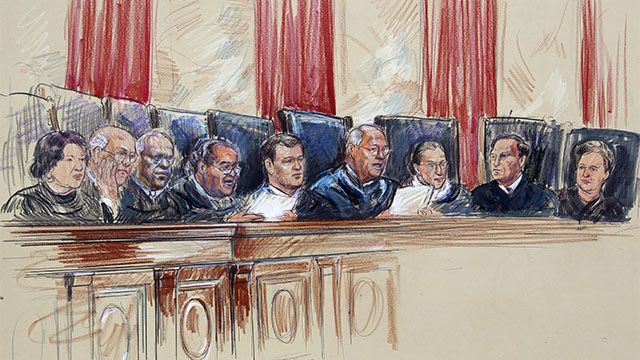
The Supreme Court further opened the doors of our democracy to big money in its ruling today in McCutcheon v. FEC. In a five-four split along ideological lines, the Court ruled that overall limits on individual campaign contributions were unconstitutional under the First Amendment. The Court left in place the cap on donations to a single candidate that conservative donor Shaun McCutcheon also challenged in the case. In a concurring opinion, Justice Clarence Thomas moved to strike that limit down as well.
“I was disappointed by the Supreme Court’s decision today,” said Sen. John McCain (R-AZ), who, along with former Sen. Russ Feingold (D-WI), enacted the Bipartisan Campaign Reform Act in 2002. Many of the provisions of that Act have since been rolled back by Supreme Court decisions, including the 2010 ruling in Citizens United v. FEC. “I am concerned that today’s ruling may represent the latest step in an effort by a majority of the Court to dismantle entirely the longstanding structure of campaign finance law erected to limit the undue influence of special interests on American politics.” McCain said he worried that the ruling would lead to a spate of campaign finance and corruption scandals.
Sen. Bernie Sanders (I-VT) denounced the ruling saying it would fundamentally undermine American democracy. “The Supreme Court is paving the way toward an oligarchic form of society in which a handful of billionaires like the Koch brothers and Sheldon Adelson will control our political process,” he said in a statement.
At The Daily Beast, Lawrence Lessig, a reform advocate and law professor at Harvard University, argued that the decision didn’t take the framer’s intent into account in its narrow definition of “corruption” as a quid pro quo exchange of cash for policy between donors and politicians. Corruption, he writes, can also occur when politicians are dependent on one class of citizen. “Already we have a system in which Congress is dependent upon the tiniest fraction of the 1% to fund its campaigns. I’ve estimated the number of relevant funders is no more than 150,000 (about the number of Americans named ‘Lester.’) If aggregate contribution limits are struck, that number will fall dramatically,” he wrote.
The decision outraged good government groups, who have been working since 2010 to stem the flow of special-interest money into politics following Citizens United. In that decision, the Court’s conservative majority held that money is speech, and that the federal government could not restrict it by limiting “third party” campaign spending by corporations and unions. That ruling gave rise to super PACs and the dark money groups that deep-pocketed wealthy donors use to funnel money to support politicians who share their interests.
“Yes, you and I now have the ‘right’ to spend as much as we want, too. But no regular person can compete with Charles and David Koch,” wrote Robert Weissman, president of the good government advocacy group Public Citizen. “There are literally only a few hundred people who can and will take advantage of this horrendous ruling. But those are exactly the people our elected officials will now be answering to.
“That is not democracy. It is plutocracy. Today’s reckless Supreme Court ruling threatens so many of the things we love about our country. No matter what five Supreme Court justices say, the First Amendment was never intended to provide a giant megaphone for the wealthiest to use to shout down the rest of us.”
Former Secretary of Labor Robert Reich echoed these sentiments in a Facebook post, writing that the decision will allow wealthy individuals to purchase “unparalleled personal influence in Washington,” “drowning out the voices of ordinary citizens.” He added: “This is the most brazen invitation to oligarchy in Supreme Court history.” Reich called for an amendment to the Constitution stating that “(1) money is not speech under the First Amendment, (2) corporations are not people, and (3) we the people have the right to set limits on how much money individuals and corporations can spend on elections.”

